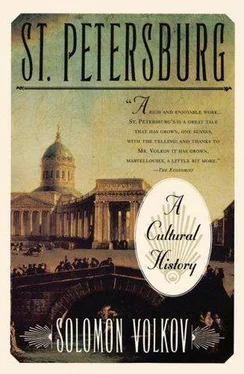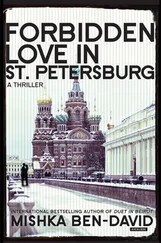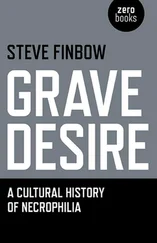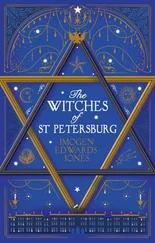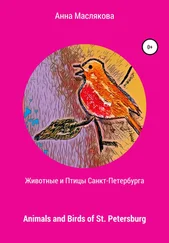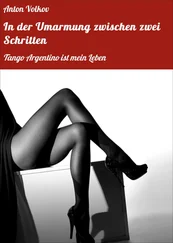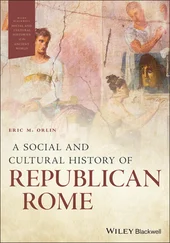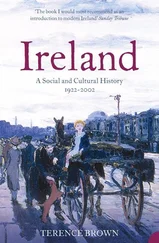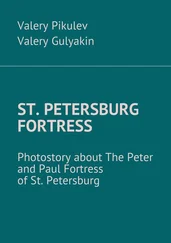
St. Petersburg
A Cultural History
by
Solomon Volkov
To Erwin A. Glikes (1937-1994)
For eighteen years my publisher, mentor, friend
Other Books by Solomon Volkov

Young Composers of Leningrad (Leningrad and Moscow, 1971)
Testimony: The Memoirs of Dmitri Shostakovich (New York, 1979)
Balanchine’s Tchaikovsky: Conversations with Balanchine on His Life, Ballet and Music (New York, 1985)
From Russia to the West: The Music Memoirs and Reminiscences of Nathan Milstein (New York, 1990)
Joseph Brodsky in New York (New York, 1990)
Remembering Anna Akhmatova: Conversations with Joseph Brodsky (Moscow, 1992)
… absence is the best medicine for forgetting … but the best way to forget forever is to see daily …
Anna Akhmatova
{1} 1 1 Anna Akhmatova, Sochineniia (Works), 2 vols., vol. 2 (Moscow, 1986), p. 205.

On May 16, 1965, a string quartet of young musicians with their instruments in cases and their folding music stands boarded a cold and uninviting commuter train on the outskirts of Leningrad en route to the northern shore of the Gulf of Finland. It was a Sunday, and they were off to visit the poet Anna Akhmatova, who every spring spent her time in the dacha settlement of Komarovo, the former Kellomäki, some forty kilometers from Leningrad.
I was twenty-one and first violinist of the ensemble, made up of students from the Leningrad Conservatory. Since my youth, I had known by heart many of Akhmatova’s poems, for I considered her the greatest Russian poet alive, as did a multitude of other literature lovers, and I had long wanted to express my delight and deepest respect to her. Finally, I learned Akhmatova’s telephone number, called her, introduced myself, and offered to play whatever she liked. After some reflection, she named Shostakovich, a very fortunate choice for us, because just recently we had been the first ensemble in Leningrad to have learned his latest quartet, the Ninth, and performed it at the Shostakovich Festival in Leningrad with the composer present.
And this work, a half-hour piece not yet published, we performed for Akhmatova at her green dacha, which she called “a booth.” It was probably the most unusual concert performance of my life—for an audience of one, a seventy-five-year-old grande dame in a black kimono worn over a festive pink dress, who sat majestically in a deep armchair, her eyes half shut. She seemed to be absorbing the bitterness, alienation, and tragic intensity of Shostakovich’s music, so compatible with her own late poetry. The dramatic fates of Akhmatova and Shostakovich, closely tied to Petersburg, had crossed more than once. They had both been criticized by the Soviet authorities; they had addressed each other in their works, and in the book of poetry she gave the composer, Akhmatova had written: “To Dmitri Dmitrievich Shostakovich, in whose era I live on earth.”
While we played, the unpredictable Baltic weather, probably in unison with the music, went crazy; a terrible wind was followed by hail and then snow. But when we finished, the sun was shining. Akhmatova sighed, “I was afraid only that the music would come to an end.” Then Akhmatova and I went out on the porch. And nature—perhaps continuing its competition with the music—tried to prove that it always had the last word if it wanted it: above snow-covered Komarovo a brilliant rainbow filled the sky.
Enjoying the rainbow, Akhmatova noted portentously in her throaty, hypnotic voice, “The weather was like this, I recall, in May 1916” and proceeded to recite her poem “May Snow,” written almost half a century earlier.
A translucent veil covers
The fresh turf and melts unobserved.
Was there a lover of Russian poetry who did not know that languorous, magnificently realized poem, which ended with the lines,
In me reposes the sadness which King David
Regally bestowed upon the millennia.
I was struck by Akhmatova’s uncanny ability, which I later learned was very characteristic of her, to combine seemingly incompatible historic periods and events and make complex parallels between them, showing, in Akhmatova’s opinion, a predestination and repetition of the apparently most unexpected and unpredictable turns of fate. For this witness to and participant in the cataclysms of the twentieth century, who had survived immeasurable suffering and trials, the times were out of joint, and setting them right was the most natural undertaking, her daily duty. Akhmatova extended with ease an instantaneous but sturdy thread between the snows of 1916 and 1965, at the same time conscious of the significance of such a union, only superficially random, which inevitably took on a profound cultural and philosophical meaning. For me, this calm imperiousness in dealing with time and space was one of the most significant lessons I took away from my encounters with Akhmatova. That is why I trace to that extraordinary May day in Komarovo, filled with transcendent music and illuminated by the marvelous rainbow, the impulse realized almost thirty years later in this book.
Whenever I visited the Russian Museum in Leningrad—to my mind the best collection of Russian art in the country—I often stopped in the section devoted to early-twentieth-century painting by the enormous decorative panel created in 1908 by Leon Bakst, a leading figure in the artistic association Mir iskusstva (World of Art) and famous in the West as the art director of Diaghilev’s Ballets Russes. Entitled Terror Antiquus (Ancient Terror), that imposing painting depicted the destruction of ancient Atlantis, the mythical civilization that flourished, according to Plato, on an enormous island in the Atlantic Ocean. The island’s inhabitants had achieved incredible cultural and spiritual heights but the gods punished them for their excessive pride. Atlantis was swallowed up forever by the churning ocean.
Bakst’s painting, with its bird’s-eye view of the violent storm, the ancient temples slipping into the ocean, and the theatrical flash of lightning crossing the canvas, made a striking impression on me. I was particularly struck by the statue in the center of the composition, a goddess who accepted with a calm smile the destruction of the civilization that had given birth to her. The goddess was isolated from the chaos around her by a higher wisdom, a higher knowledge that protected her.
I was a teenager then and found out only later that Bakst, a passionate devotee of the ancients, had depicted in Terror Antiquus the goddess Aphrodite, who symbolized for him the victory of love and art over blind destruction. And still later that painting seemed to me the almost perfect visual metaphor for the Atlantis of the twentieth century—the glorious culture of the city in which I lived.
Founded in 1703 as Sankt-Peterburg by Peter the Great on the eastern shore of the Gulf of Finland, the capital of the Russian Empire, this city, twice willfully and unwisely renamed (it became Petrograd in 1914 and Leningrad in 1924), was world famous as an architectural gem, with resplendent palaces proudly lining the banks of the spectral Neva.
Читать дальше
